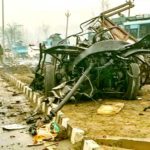IDR Blog
Modi's Russia visit: Short in Duration, Long in Achievements
Indian Prime Minister Narendra Modi paid a 36-hour bilateral visit to Vladivostok, Russia September 4-5 to participate in the 20th annual bilateral summit and as chief guest to the 5th Eurasian Economic Forum at the invitation of President Vladimir Putin. The significance of the visit was enhanced by the unequivocal support by Russia, just before the visit, to India’s position on the removal of Kashmir’s ‘special status’ and inadmissibility of third-party mediation in India-Pakistan issues.
Relations between India and Russia had become listless at the beginning of Modi’s first term because of India’s perceived growing closeness to the USA and Russia’s increasing dependence on China, as well as its expanding flirtations with Pakistan including in arms supplies. Russia’s decision to engage in military exercises with Pakistan, immediately after the terror attack at Uri, in Jammu & Kashmir, in September 2016, represented a low point in bilateral understanding.
Relations witnessed an upsurge after the informal summit in Sochi in May 2018. Since then, Modi and Putin have met several times. This was Modi’s 5th bilateral visit to Russia since assuming power in May, 2014. Russia’s Far-East occupies an expansive tract of more than 6 million sq km, about twice the size of India, but a sparse population of barely 8 million. The area is richly endowed with immense untapped supplies of oil, gas, minerals, diamond, timber, among others.
Commerce and Industry Minister Piyush Goyal visited Vladivostok in mid- August with chief ministers of Uttar Pradesh, Haryana, Gujarat and Goa and a 150-member business delegation to prepare for the visit. External Affairs Minister S Jaishankar and National Security Adviser Ajit Doval visited Moscow. Russian Deputy PM Yury Trutnev, Presidential Envoy to Russia’s Far East, visited India in June to prepare for the visit.
Modi’s visit provided a big impetus to bilateral ties, in commercial and economic terms as well as in strategic partnership. In Modi’s own words, the visit imparted “a new direction, new energy and new speed” to relations between the two countries.
The visit occurred at a time of rapid Asian geopolitical flux, marked by growing assertiveness of China in the South China Sea and the Indian Ocean. US-China trade war is escalating; South Korea-Japan ties are under strain. Developments in Ukraine and Crimea in 2014 and the ensuing Western sanctions pushed Russia into China’s embrace. Notwithstanding the display of bonhomie between leaders of Russia and China, it appears increasingly likely that this is a tactical affiliation rather than a strategic alliance. Sooner rather than later, schisms between the two countries are likely to surface. Under these circumstances and with the growing unpredictability of US President Donald Trump, both India and Russia feel it is in their interest to significantly bolster their partnership.
Russia invited Indian investment in the region. It was agreed that Indian companies would invest heavily in the oil and gas sector for which a five-year road map was signed. Investments in diamond and timber are to be increased. These measures will substantially increase bilateral trade which has been languishing at the highly inadequate level of USD11 billion for the last several years. The India-Russia partnership needs to grow beyond defence supplies and nuclear energy.
Modi launched the ‘’Act Far East’’ Policy and asserted that henceforth Vladivostok would serve as the springboard for the region. India’s Indo-Pacific Strategy and Russia’s Pivot to Asia share a synergy for cooperation in the region. They decided to launch Chennai-Vladivostok maritime connectivity and explore possibilities of shipping cargo from India to northern European countries via the Northern Sea route (Arctic route) which would be shorter and more economical than the traditional route. Modi spoke enthusiastically about promoting Indian manpower exports, which have acquitted themselves creditably all over the world, to the region.
Agreements spanning nuclear and non-nuclear fuel and energy, spare parts for defence equipment, collaboration in space and training of Indian astronauts, agriculture, tourism and railways, among others, were signed. Modi’s visit was short in duration but long on achievements. Decisions, both at government and private-sector level are expected to provide a quantum jump in ties.




